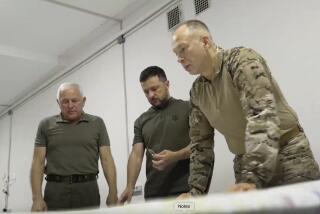Iraqis Confirm Turkish Troop Entry
- Share via
ANKARA, Turkey — Iraqi Kurdish officials confirmed Sunday that at least 500 Turkish troops have pushed 100 miles into northern Iraq in their deepest incursion into the Kurdish-controlled enclave in 15 years of war against Kurdish separatists.
The officials described the move as preparation for a major offensive against about 2,500 rebels belonging to the Kurdistan Workers Party, or PKK, who are dug in along a 25-mile-long swath of mountainous territory on the Iran-Iraq border.
Meanwhile, the mass-circulation Turkish daily Sabah repeated earlier reports that as many as 10,000 Turkish troops have poured into northern Iraq since Dec. 20 in response to pleas for help from one of the main Iraqi Kurdish factions there. The Patriotic Union of Kurdistan, or PUK--which controls the southern third of the Iraqi Kurdish enclave--has been clashing with the Turkish Kurd PKK since September.
“The PKK has occupied 45 of our villages since September,” a PUK official who requested anonymity said in a telephone interview. “They are terrorizing our people and should leave our territory at once.”
As many as 200 PUK soldiers have been killed in fighting with the PKK in recent weeks around the towns of Sulaymaniyah and Raniyah, according to the Iraqi newspaper Al Iraq, which in an article Friday also alluded to Turkish military involvement.
The Turkish general staff issued a statement Sunday denying the incursion, saying that “the [media] reports involve no truth.” But Turkish Prime Minister Bulent Ecevit said in a statement reported by the official Anatolian news agency: “Turkey is of course providing technical support [to the Iraqi Kurds]. This is necessary for our own security.”
Western diplomats here in the Turkish capital say they have been aware of a Turkish troop buildup in northern Iraq for some time.
“We are deeply concerned. It will only further destabilize what is already a highly unstable region and could even provide [Iraqi President] Saddam [Hussein] with an excuse to intervene,” said a European diplomat based in Ankara who also requested anonymity. But this diplomat, like several others, characterized the reports of a buildup of thousands of troops as grossly exaggerated.
Osman Ocalan, brother of the captured PKK leader Abdullah Ocalan, was quoted Sunday by the Kurdish daily Ozgur Politika, which is distributed in Europe, as saying: “The PUK has invited Turkish troops to destroy the Kurdish national movement and Kurdish unity. This intervention will only provoke further rebellions throughout Kurdistan.”
Northern Iraq has been under the control of two rival Iraqi Kurdish factions, the PUK and the Kurdistan Democratic Party, or KDP, ever since they united for a failed uprising against Hussein at the end of the Persian Gulf War. Millions of Kurdish civilians flocked to the Iranian and Turkish borders at the time, provoking an international outcry and prompting the Gulf War allies to establish a “no fly” zone over the region to protect the refugees against attack by Iraq.
Traditional rivalries between the KDP and the PUK, however, led to a breakdown of the joint government they formed in 1992 after the Iraqi Kurds’ first-ever parliamentary elections. The enclave has been racked with violence since, and U.S.-led mediation efforts have failed to secure a lasting peace between the warring factions.
Feuding between the Iraqi Kurdish groups has been further stoked by Turkey and Iran. With restive Kurdish minorities of their own, both countries fiercely oppose the emergence of an independent Kurdistan on their borders and hence have encouraged factional war between the Iraqi Kurds and at the same time armed them to fight their own Kurdish separatist groups.
Northern Iraq has been further destabilized by the PKK, which has been fighting on and off with both of the Iraqi Kurdish groups in a bid to carve out territory for itself in the region under their control. And Turkish troops have repeatedly intervened in the Kurdish enclave in pursuit of PKK guerrillas while the United States and European governments, wary of upsetting their North Atlantic Treaty Organization ally, have looked the other way.
The PKK rebels were dealt a crippling blow when Abdullah Ocalan was captured and brought to Turkey in February 1999. After a monthlong trial on a prison island offshore from Istanbul, he was sentenced to death for treason, but he continues to be held in solitary confinement.
Turkey has put a stay on his execution pending review of his case by the Strasbourg, France-based European Court of Human Rights. In exchange, Ocalan has offered to serve the Turkish state, dropped his demands for independence, ordered his followers to end their fight and to withdraw from Turkey to northern Iraq, and said he will settle for cultural rights for about 12 million fellow Kurds living in Turkey.
Turkey’s hawkish generals, however, have repeatedly voiced their opposition to lifting bans on Kurdish broadcasting and education and have vowed to keep up their battle against the PKK until “every last terrorist is neutralized.”
More to Read
Sign up for Essential California
The most important California stories and recommendations in your inbox every morning.
You may occasionally receive promotional content from the Los Angeles Times.













